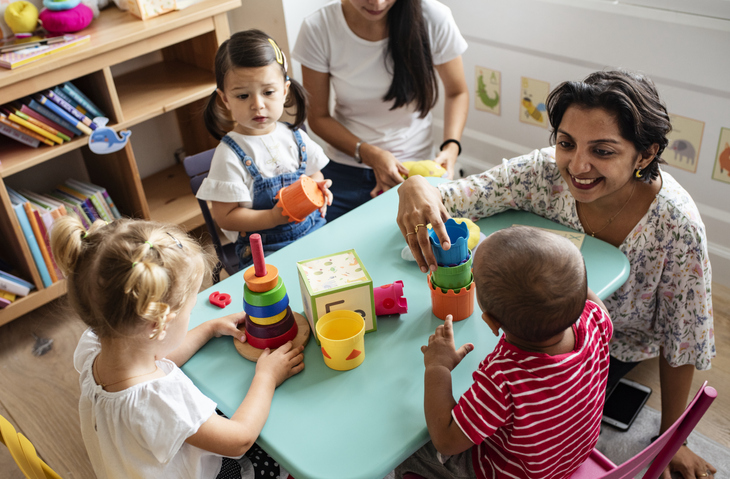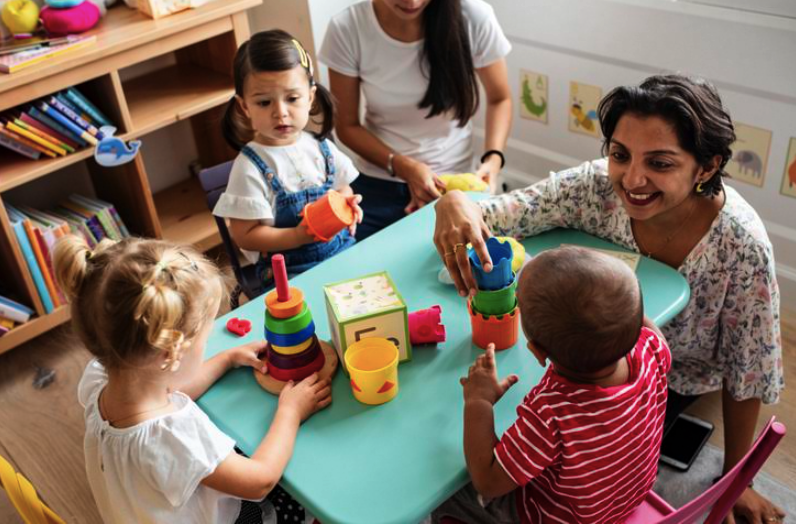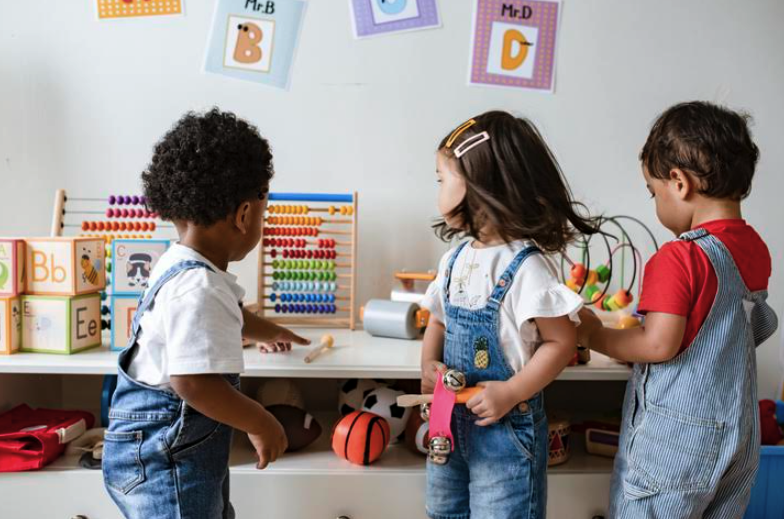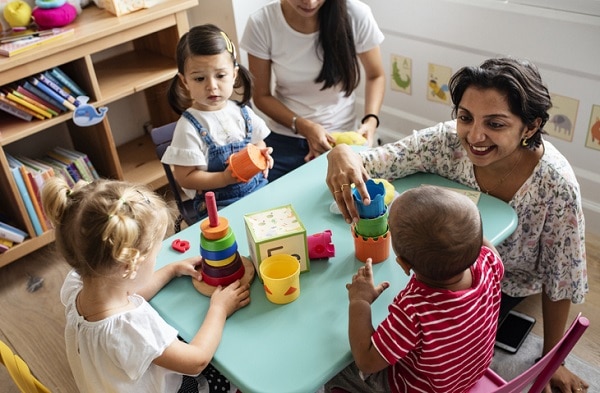Category: Early Childcare Assistant
What Those Pursuing an Early Childcare Assistant Diploma Should Know About Family Literacy Day
January 24, 2022Early childhood education is important for children’s development – especially for improving their literacy skills. This is why Family Literacy Day, a national celebration of literacy since 1999, always takes place on January 27th. This is time for schools, literacy organizations and libraries to raise awareness of the value of reading and for families to engage in literacy-related projects together.
At Medix College, we provide aspiring early childcare assistants with extensive training that allows them to work under the guidance of teachers. Students will learn how to provide a safe and nurturing environment for children that encourages their social, emotional, physical and intellectual development. Read on for a look at some important things to note when pursuing an early childcare career!
You’ll Be an Advocate for Literacy Development After Finishing Early Childcare Assistant College
Before children can learn to read and write, they need the proper guidance to develop their ability to speak, listen and interpret their surroundings. While establishing these building blocks, a childcare assistant will play a vital role in a child’s literacy development. Literacy development helps a child to prepare for school, socialize, develop their own ideas and become an independent learner. You’ll be a beacon for literacy development as you help guide families in their child’s development. After you complete your training from early childcare assistant college, you’ll be able to collaborate with teachers in planning, developing and implementing daily activities that support and promote a child’s development. You’ll also discuss a child’s progress, address any issues and offer solutions with staff.
Communication Through Activities Is Important for Early Childhood Development
After you complete your training from an early childcare assistant college in Ontario like Medix College, you will understand the value of communicating with a child at an early age. You’ll collaborate with teachers in creating seasonal arts and crafts and organizing fun educational games to improve their literacy. You’ll be able to work with families in encouraging them to communicate regularly with their children, which will help develop their ability to speak, listen and understand as they get older. Facial expressions along with words and singing all play a role in improving a child’s communication and language skills.

Reading Develops a Solid Foundation for Literacy
As an early childcare assistant, part of your daily responsibilities will include telling stories and organizing reading exercises with children. Reading helps children develop a solid foundation for literacy, as they observe how a word is written. By reading, children can take pleasure in learning new things–while improving their thinking and problem-solving skills, as well as identifying pictures on a page to follow along with you while you read. Reading to children will also give you the opportunity to bond with them and help establish a healthy relationship. Therefore, it is also encouraged for families to read with their children on Family Literacy Day, as it creates a strong bond between them.

Rhymes Help Connect the Sound of a Word to How it Is Written
Part of a child’s early development involves identifying different sounds for various words. As mentioned earlier, reading helps build a solid foundation for literacy, and when you introduce rhyming into the mix, it can help children make the connection between the sound of a word and how it is written.
Part of your responsibilities as an early childcare assistant is to organize games that assist with learning. Rhyming games can help children recognize common sounds and draw connections between words that will expand their understanding of the English language.
Are you ready to pursue an early childcare assistant diploma?
Contact Medix College to get started!
Potential Work Environments to Explore After Early Childcare Assistant College
December 20, 2021Few jobs are more rewarding than those that allow you to support, inspire, and nurture young minds. As an early childcare assistant (ECA), you will have the opportunity to work closely with young children, laying a solid foundation for their education and growth, and essentially helping to shape who they will become.
With the right training, you’ll gain the knowledge and skills needed to thrive on this career path. Your courses will provide insights into better understanding children and their needs–as well the mental, physical, and emotional developmental stages that they go through in their early years.
Once you become an ECA, you’ll be responsible for observing infants, toddlers, and preschool-age children, and supporting their growth and development. You’ll also be able to do this from within a number of different work environments. Here, we discuss potential environments you can explore upon graduation.
Work Within a Childcare Centre After Early Childcare Assistant College
A childcare centre offers part-time and full-time childcare services to working parents of children aged between a few months old and pre-school or kindergarten age. If you choose to work in this setting after earning your early childcare assistant diploma, you’ll be responsible for caring for young children from early in the morning well into the afternoon.

As an ECA at a childcare centre, you’ll have many responsibilities throughout your workday. On a typical day, you’ll greet the children when they arrive, feed them at snack times and lunchtime, supervise their nap period, and help them participate in learning activities, crafts, and playtime in between. Such duties require extensive training since you’ll need to have the knowledge and skills to prepare educational activities, help children to eat, dress, and use the toilet, as well as record observations about their progress and challenges for your supervisors to share with their parents.
Find Work in a Family or Child Literacy Centre
A family or child literacy centre is a designated place or space that’s specifically designed to offer children support in reading comprehension, writing development, language learning, and social skills. This area is meant to provide children with opportunities to read, write, and collaborate with others all while developing and enriching their literacy skills. Such centres could be integrated into existing classrooms and libraries, and are typically organized and executed by educators and professionals holding an early childcare assistant diploma.
If you decide to work in a child literacy centre, some of your daily responsibilities will include assisting the educator in:
- Planning and delivering programs and lesson plans
- Leading lessons for classes or small groups
- Coordinating literacy and learning activities
- Observing and recording childrens’ progress and information
- Tracking attendance
- Communicating with parents and/or caregivers
This type of environment is the right fit for someone who is passionate about literacy and understands the importance of building this knowledge from a young age. Here, you will provide young students with the opportunity to build skills, collaborate with others, and develop routines, all at a level and pace that is manageable for them.

Secure an ECA Position at a School After Earning Your Diploma
Another environment you might choose to work in once you’ve completed your program is a school, working with children up until the age of 12. Within a school setting, an ECA works under the guidance of the teacher. Their main responsibility is to assist and lead children in educational activities that support and promote their physical, cognitive, emotional, and social development.
You might lead activities such as reading stories, teaching and singing songs, preparing arts and crafts projects, and more. As an ECA, you could also be called upon to observe children for signs of potential learning or behavioural challenges, and document such observations for teachers and parents. You might organize activities for before and after school programs, prepare snacks, clean and arrange classrooms, and more.
Finally, one of the most important roles of any professional working with young children is to create and maintain an environment that promotes the safety, health, security, and well-being of children.
Are you ready to enroll at an early childcare assistant college in Ontario?
Contact Medix College to learn how you can get started!
3 Ways to Help Children Build Independence With an Early Childcare Assistant Diploma
November 19, 2021A career in early childhood assistance is a rewarding experience–seeing the young minds and bodies of children learn and acquire new skills every day. As an early childhood assistant, you get to foster this growth by creating an encouraging, safe and nurturing environment for all children in your workplace.
Learning to cater your knowledge and guidance to the development of childrens’ social, emotional, physical, and intellectual abilities is a highly respected skill of an early childhood assistant. Not only will perfecting these abilities for the child make your job easier as you’re able to step back from each task the child must perform, but it will also provide you with the satisfaction of knowing that the child is progressing and proud of their accomplishments. It can be hard for a child attempting to learn new tasks, so here are a few tips you can implement in order to help along the process while still building independence for the child.
1. How to Make Getting Dressed a Successful Task for a Child
Children love getting themselves dressed, as they are really able to express themselves and have a great sense of pride when they’re finished. They may need some assistance, but with a bit of preparation, you should be able to guide them in the right direction without hindering their feeling of independence.
When getting dressed, it’s important to give the child ample time to complete the task. Yes, they are slower than you are in getting dressed, so be sure to prepare for that added time so they can figure everything out. You should offer them limited choices over which dressing task they can try to complete themselves, such as buttoning up their jacket or tying a shoe, so they feel they have some autonomy in the choosing process. Break down the task for them and help them with where to start the order of operations. If they are struggling or ask for help, be sure to step in, and then let them continue on their own and finish with pride.

2. Lunchtime Activities for Children You Can Implement After Your Early Childhood Assistant Diploma
A great tip for approaching lunchtime independence is to allow the children to choose where they want to sit. Offering a placemat or cup that has their name on it will help them set up their own eating space, helping them feel proud of their area and more likely to stay for their meal. Another great tip for child independence at lunchtime is the option for the children to serve themselves, giving them the opportunity to develop gross motor skills and practice their portion selection.
Finally, allow the children to take responsibility for their spills and any lunchtime clean up that needs to be done. Using the skills learned in your early childcare assistant diploma, you can foster this independence by making it a positive experience for the children. Once they realize that enjoyable and social meals require a bit of clean up, they will be more accepting of the cleanup process.

3. Assisting Children with Washroom Routines to Foster Independence
A big factor that aids in independence in the washroom is having the room set up for the child’s success. A step stool to reach the toilet and sink, along with soap that they can effectively disperse and use are both musts.
Try to maintain a schedule during your work following early childcare assistant college, bringing children to the washroom at regularly scheduled times. This will help them feel a sense of routine, allow them to understand what to do, and give them plenty of chances to practice the skill independently.
Are you interested in attending an early childcare assistant college in Ontario?
Contact Medix College for more information!
3 Tips for Compiling a Developmental Checklist After Early Childcare Assistant College
October 01, 2021Early childcare assistants play a pivotal role in the healthy development of young children. Within a classroom setting or daycare facility, they use their knowledge of childhood development to ensure their young charges have access to an environment that’s both safe and nurturing. With the help of early childcare assistants, children are able to gain the confidence, cognitive capabilities, communication skills, and mobility to grow in a healthy way.
If you’re currently training to become an early childcare assistant, you’ll probably find yourself tasked with creating a developmental checklist at one point in your career. A developmental checklist is a tool which can be used to measure and understand the developmental progress of the children that early childcare assistants work with. This checklist allows these professionals to determine the areas where a child is excelling, and where they might need additional guidance, enabling them to provide the highest level of care and support. Below, discover some tips for creating a developmental checklist throughout your career.
1. After Early Childcare Assistant College, Become Familiar with Important Milestones
As an early childcare assistant, the first step to creating a developmental checklist is to familiarize yourself with the important milestones of child development. As you may have learned during early childcare assistant college, there are a number of milestones which children are expected to reach at particular ages. For example, at two years old, a child may start to identify and sort colors and shapes, and repeat phrases or words they overhear. At three years old, children may start to follow simple instructions, learn how to dress and undress themselves, and use their imagination. With your knowledge of these milestones, you can create a developmental checklist that reflects what children should be accomplishing or learning at a certain age.

2. Divide Your Developmental Checklist into Different Categories
Once you’ve gained an awareness of important childhood milestones, you can begin to create categories for your checklist, based upon what you’ve learned. For one of the sections, you may want to include measures of a child’s communication, literacy and language skills. This can be used to measure a child’s relative comprehension, vocabulary, listening skills, speaking skills, reading capability, knowledge of the alphabet, and other related areas of aptitude. Another section might focus on a child’s mathematical development, which can include their ability to count, their ability to identify patterns and shapes, their capacity for analysis, and more. Within your developmental checklist, another section might be devoted to mobility, measuring a child’s motor skills and spatial awareness. Lastly, your developmental checklist can include a section focused on how a child is developing both emotionally and socially. Within this section, you can include areas such as interaction, knowledge of family and self, cooperation, and other related factors.

3. Develop a System for Measuring Children’s Progress
After getting your early childcare assistant diploma, another important component of putting together an effective developmental checklist will be to develop a system of measurement. While a child’s developmental progress doesn’t need to be measured qualitatively, there are still a few indicators that you can use to determine a child’s stage of growth. A system of measurement can be scaled according to whether the child has:
- Mastered the skill or task
- Is in the process of mastering a skill or task
- Is not yet showing signs of demonstrating a skill or task
- Has not yet been taught a skill or task
Using these measurements, you can gauge how a child is developing, and provide them with the support they need to continue developing, throughout your career as a personal support worker.
Ready to attend early childcare assistant college in Ontario?
Launch your career with a program at Medix College today!
How to Handle Temper Tantrums with an Early Childcare Assistant Diploma
July 16, 2021
For young children, temper tantrums are a normal part of life. Hunger, fear, fatigue, or feeling ill are all triggers that can cause a temper tantrum—an outburst characterized by screaming, crying, or often both. The world can be overwhelming for children, and their inability to express themselves when they want something may lead to a tantrum, which can be both stressful and frustrating for caretakers.
If you’re interested in a career as an early childcare assistant, you’ll be providing assistance to teachers in supporting the development of young children. You’ll organize activities, ensure that children feel safe and nurtured, and provide a stimulating environment within which children can grow. However, you may also deal with the occasional temper tantrum. Below, explore more about temper tantrums, why they happen, and how to handle them as an early childcare assistant.
The Science Behind Temper Tantrums Explained for those in Early Childcare Assistant College
Temper tantrums manifest as a child’s physiological response to a detected threat. Understanding a few neuroscience terms can help to further understand why they occur. Both the amygdala and the hypothalamus are involved in causing a child to have a temper tantrum. The amygdala is a part of the brain that processes certain emotions such as anger and fear. The hypothalamus is responsible for controlling some bodily responses like temperature and heart rate. When a child detects a threat, their amygdala is responding, and the hypothalamus incites a tantrum.
If you have an early childcare assistant diploma, it’s important to note that while young children may not be able to control their ability to respond to a tantrum, you have the capacity to help them work through it. Find out how below.

Preventing Temper Tantrums: A Brief Guide
Although sometimes impossible to prevent, there are a few strategies that you can use throughout your career to discourage a tantrum from occurring. First, you’ll want to make sure that children have a consistent routine. Consistency helps children know what to expect, preventing triggering feelings such as fear from arising. Additionally, make sure to praise children when they do something well. This inspires confidence, which will boost their mood and discourage a tantrum from arising. You can also give children a choice whenever the opportunity arises, such as by letting them decide which snack they want. This helps them to feel that they are in control rather than feeling like they can’t express themselves.

When a Temper Tantrum Occurs, Here’s How to Deal With It
Even when you try to prevent a tantrum, you’re still bound to work with children who experience them after graduating from early childcare assistant college. The best way to respond to a tantrum is to remain calm yourself. Raising your voice or panicking will typically only make the behaviour in the child worsen. During a tantrum, you can try to distract a child by pointing something out, reading them a book, or telling them a story. You can also try to hold a child to calm them and make them feel more secure. If none of these methods work, sometimes, the best option is to wait a tantrum out. It will eventually pass, and then you can comfort the child, provide support, and help them to move on.
Looking for an early childcare assistant college in Ontario?
Start your training with a program at Medix College today!
4 Fun and Educational Games for the Classroom for those Earning an Early Childcare Assistant Diploma
May 07, 2021
There’s no doubt that it can be challenging for instructors to keep a classroom of young children focused and engaged! Group games are a great way to accomplish the task. This let’s kids burn off some extra energy while stimulating their social and intellectual development in a setting that’s fun and exciting.
Read on to discover four great games you can implement throughout your career as an early childcare assistant.
1. Graduates of Early Childcare Assistant College Can Use “Simon Says” to Teach Kids to Follow Directions
“Simon Says” is a great game to play in a classroom full of young children. This game is not only fun, but it also teaches children how to pay attention and follow specific directions–improving their capacity to focus and listen. “Simon Says” is played by choosing a leader, who gives a command to children beginning with the words “Simon Says.” However, if a command is given without saying “Simon Says” first, this means that the children should ignore this command. A simple method for getting an energetic group of children to focus and listen, this game is perfect for those with an early childcare assistant diploma to incorporate within their classroom curriculum.

2. “Red Light, Green Light” is a Great Game for Developing Executive Function
Executive function refers to the mental skills and cognitive processes that help us to regulate our emotions and impulses, as well as plan and achieve our goals. While children tend to make decisions more impulsively and react more quickly, “Red Light, Green Light” is a great game to help children build executive function in a way that they’ll enjoy. Based on commands involving “Red Light” (stop) and “Green Light” (go), children walk or run from one end of a space to another–while listening closely to directions and controlling their impulses through play.
3. “Four Corners” Helps Kids to Focus While Having Fun
“Four Corners” is a great classroom game for teaching children how to focus–with a bit of suspense that provides some excitement. One child stands in the center of the room with their eyes closed and counts to ten. While counting, the rest of the class will silently move to one of the room’s four corners–which can be labelled with a number. After counting down, the child in the centre of the room will keep their eyes closed. They will then try to guess which corner of the room has the most students in it based on the sounds they heard while counting.

“Four Corners” is perfect for graduates of early childcare assistant college to use in honing their classroom’s ability to focus and listen closely. Children will hold back their laughter while trying to stay silent–adding to the fun of the activity.
4. “Freeze Dance” Is the Perfect Way to Let Kids Release Their Energy
As any early childcare assistant probably knows, it sometimes feels impossible to convince a classroom of kids to quiet down or pay attention. “Freeze Dance” is the perfect game for allowing kids to let off some steam while developing their self-regulation skills. Play some music for the class to dance to, and when the music pauses, instruct the children to “freeze” in the position they’re in. Experiment with different styles of music and rhythms, encouraging kids to explore a variety of movements. Not only is this game easy to play, but it’s plenty of fun for the whole class too!
Want to attend early childcare assistant college in Ontario?
Explore programs at Medix College today!
How You Can Help Children with ADHD After Earning Your Early Childcare Assistant Diploma
March 12, 2021
If you want to become an early childcare assistant, you’ll be working in classrooms alongside teachers to support the development of young children. Throughout your career, it’s likely that you’ll be working with young children who are diagnosed with or are experiencing symptoms of attention deficit hyperactivity disorder (ADHD). ADHD is a neurodevelopmental disorder, and it’s the most common mental health disorder that children will experience. Studies conducted around the world have shown that 5% to 7% of school age children have ADH– meaning that in an average classroom, there are one to three children with ADHD.
ADHD can manifest differently in children, but it often impedes their ability to focus in a classroom setting. Children with ADHD may require extra support from early childcare assistants. If you’re training to become an early childcare assistant, here’s what you need to know about helping children with this disorder.
Those in Early Childcare Assistant College Should Know What ADHD Looks Like
The symptoms of ADHD can be different from one child to the next. Most commonly, a child with ADHD is hyperactive, inattentive or impulsive, or a combination of some or all of these characteristics. When working in the classroom, graduates of early childcare assistant college should be able to recognize the symptoms of ADHD in order to provide the highest level of support for children who may be struggling as a result.

Hyperactivity is typically the most obvious indicator of ADHD, and symptoms may include constant movement or fidgeting, difficulty sitting in one place or relaxing, and trouble staying quiet. A child with ADHD can also be inattentive, leading to trouble focusing, listening, remembering things, following instructions, or paying attention. These symptoms can manifest in addition to or instead of hyperactivity. Lastly, children with ADHD may act impulsively and struggle with self-control–causing them to frequently interrupt or overreact.
How Does ADHD Impact a Child’s Ability to Perform in the Classroom?
In the classroom, students are expected to be able to pay attention, sit still, concentrate on their activities, as well as listen to and follow instructions. Children with ADHD often have a hard time meeting these types of expectations–impeding their ability to absorb information and to participate and learn at the same pace as other students. Inattentive children may have trouble following instructions from teachers or focusing on classroom activities–while hyperactive or impulsive children can be distracting to other students in the classroom.

While the behaviours associated with ADHD may at times be frustrating within a classroom setting, it’s the job of professionals with an early childcare assistant diploma to provide the support that children with ADHD need to succeed.
How Those with an Early Childcare Assistant Diploma Can Support Children with ADHD
Early childcare assistants are an important resource for children with ADHD, as they can provide them with the extra support they may require to thrive in a classroom setting. Below are a few strategies that early childcare assistants can use to meet the needs of children with ADHD.
- Keep Distractions Limited: Children with ADHD are easily distracted. In a classroom, distractions may include windows, doors, or other areas of activity. Seating a child with ADHD nearer to their teacher may help them to focus in the classroom.
- Provide Clear Instruction: When children have ADHD, they tend to have trouble focusing or remembering instructions. By making an effort to help children understand the rules and expectations, this can help them to stay on track.
- Use a System of Feedback and Rewards: Like many children, those with ADHD often respond well to consistent feedback and incentives that reward good behaviour. Children with ADHD should not feel punished for their behaviour, and it’s important for those with early childcare assistant training to make these children feel supported when they’re trying their best.
- Be Flexible: Traditional classroom schedules and structures don’t always work for children with ADHD. They may need to take a break more frequently and move around, as physical activity can help them to regain their focus and release pent up energy. Some children may also benefit from standing up during instruction, or holding an object to play with during quiet time.
Some of the strategies above may not work immediately, but it’s important that early childcare assistants are patient and persistent in developing a strategy that works for the child they’re assisting. The tools that children with ADHD develop to cope with the disorder early in their lives, as well as the support they receive, can help them to succeed in school for years to come.
Are you interested in attending early childcare assistant college in Ontario?
Medix College has the program for you. Explore your options today!
Identifying Learning Disabilities: A Look for Students in Early Childcare Assistant College
January 22, 2021 Early childcare assistants are incredibly important in childcare centres and institutions. Working together with other staff, they help to create a safe and nurturing environment for children to grow in, encouraging their social, emotional, physical, and intellectual development.
Early childcare assistants are incredibly important in childcare centres and institutions. Working together with other staff, they help to create a safe and nurturing environment for children to grow in, encouraging their social, emotional, physical, and intellectual development.
As childcare assistants directly interact with children, they are in a prime position to spot any potential signs that might indicate developmental delays or disabilities, and relay important information to others. Early identification of these developmental problems is a key factor in helping children. Here are some things to keep an eye out for as an early childcare assistant.
Recognizing Speech and Language Difficulties at an Early Stage
One of the common ways of catching a learning disability is to observe a child’s speech and language use as they interact with others. Examples of speech and language difficulties include: mixed word order in sentences, difficulty learning songs or nursery rhymes, tendencies to repeat general words instead of using more specific ones (such as using the word “thing” for most objects), unusually slow speech, or trouble responding to “why” questions.
That said, keep in mind that stuttering and speech impediments might also develop in children at a young age, which doesn’t necessarily indicate a learning difficulty.

Monitoring Children’s Growth and Progress After Early Childcare Assistant College
Part of your early childcare assistant college training will include understanding how to complete anecdotal reports, as well as how to fill out observation and developmental checklists. Learning this important task will help you to monitor the growth and progress of children in your care.
Signs to look out for in young children as possible indicators of some motor difficulties include: constant clumsiness, poor balance, trouble managing small objects (e.g. tying shoes or working buttons), or unusual struggles related to eye-hand coordination (such as in tracing or copying images). Cognition skills can be monitored by testing a child’s memory, such as the ability to memorize simple words or daily routines, as well as their understanding of basic concepts—like size or shape—and patterns, like simple counting. Catching these difficulties is a crucial step to making sure children receive the support they need.

Studying Children’s Attention and Social Behaviour
In addition to tracking children’s performance, childcare assistants should regularly observe children’s attention and social behaviour. Those training to complete their early childcare assistant diploma will be interested to know that both aspects can serve in discovering telltale signs of a learning struggle.
For instance, if a child is easily distracted or hyperactive, they could be experiencing symptoms of ADHD (Attention Deficit Hyperactivity Disorder). Impulsivity and a general difficulty to adapt to new routines are also signs that should be carefully assessed. Additionally, children who have trouble following directions or interacting with others should not be overlooked. Frequent temper tantrums and displays of frustration can also be a sign of underlying learning difficulties, and may need further assessment from the wider early childhood education team.
As an early childcare assistant, you’ll be able to make a big difference in the development of young children. Learning disabilities are not easily identified, requiring close coordination with other members of the early education team, and often other health professionals. Understanding some of the indicators can be helpful for working together with colleagues to ensure the children who do need support receive early intervention measures to overcome their struggles more effectively.
Do you want to go to an early childcare assistant college in Ontario?
Contact Medix for more information!
The Importance of Anecdotal Reports After Early Childcare Assistant College
December 10, 2019
After you finish your program, you will be able to apply what you’ve learned to help children. Under the guidance of a teacher, you can ensure students feel safe and attended to in the classroom. When their needs are nurtured, children are able to thrive socially, intellectually, emotionally and physically.
Being an observant, perceptive presence in their lives is helpful in creating these ideal circumstances. When you can record and notice what children need, you can support them. One way of recording what you see is through anecdotal reports. Read on for why these are so important in the development of children and in your career!
What Are Anecdotal Notes?
Anecdotal notes are how educators often choose to record useful observations of students. These notes are objective accounts of occurrences or behaviours, rather than containing the opinion of the person taking the note. They are concise and clear, so that they can be used as a reference later on. When multiple anecdotal notes have been compiled, they can act as documentation on student behaviour.
It’s important that anecdotal notes contain factual information, so that they can reliably inform potential decisions and actions. Early childcare assistant college can prepare you to properly take down this information so that it is useful to you and the teacher you work with.

Tips for Writing Anecdotal Reports in Your Career
Anecdotal reports are often called observational narratives, as they are narratives of different behaviours from students. These might be interactions with other students or adults, conversations or details about classroom behaviour. Anecdotal reports are written after incidents, not during. This allows you to keep caring for and working with the students without needing to stop and take notes.
The reports are a bit like short stories in that they describe what happened in the past tense, with a beginning, middle and end. When you write them, it’s important to remain objective and not allow your personal biases or views to influence what you write down. Staying as positive as you can is also important in writing down student behaviours.

Why Are They Important After an Early Childcare Assistant Diploma?
Anecdotal reports serve many purposes after an early childcare assistant diploma program. In your career, you can use these reports to track developments in individual students. You can show a student’s behaviour over a long range of time by creating anecdotal reports for different observations.
You can also use these reports to keep records of instructional requirements for individual students. Since no child is exactly the same, each child will have their own needs. You can note their behaviour on an ongoing basis to gather more data that points to how they learn best, and what things impede their learning.
In a lot of cases, behaviours might be noticed but forgotten soon after the fact. Anecdotal reports allow you to capture these things and save them, so that they won’t fall between the cracks. The documentation you keep is useful not only to you, but also to current and future teachers and their assistants. The family of a student may also benefit from hearing about their child’s behaviours and patterns. Overall, this can create a more supportive and understanding environment for each student.
Wondering what a child care assistant course can offer you?
Contact Medix College to learn more about our program.
The Benefits of Arts and Crafts Explained for Students in ECA Courses
June 21, 2019
Arts and crafts are not only a fun pastime for children—they help develop multiple skills, give children a leg up on their schoolwork, and assist them with their emotions. As an early childcare assistant you can use arts and crafts, under a teacher’s leadership, to further a child’s experience and development. When collaborating with teachers to plan daily activities, keep in mind that a little paint and glitter glue can work wonders for the next generation.
Read on to learn a little more about what cutting, pasting, constructing, and designing can bring to your career, and how you can use these activities to make a difference.
With an Early Childcare Assistant Diploma, You Can Use Art to Develop Fine Motor Skills
Fine motor skills are important for daily tasks that children are faced with—you will surely notice this when assisting with buttoning or zippering as they dress for outdoors, or when they are feeding themselves at lunchtime. Arts and crafts are a great way to develop fine motor skills, requiring children to cut or colour within lines, stick parts together, or trace drawings. Even holding tools like paintbrushes or scissors develops these skills, which are transferable to their daily routines.

Using tools like scissors helps children develop fine motor skills
Children also need to have good visual processing, to help with their hand-eye coordination, memorization, and perception of the environment around them. With an early childcare assistant diploma, you can engage children’s visual skills in a fun way, letting them use what they see to create something from their imagination. This both empowers them and gives them experience working with different colours, shapes, concepts, and spatial relations.
Encourage Children to Make Decisions after ECA Courses with the Help of Arts and Crafts
The ability to analyze a situation and solve problems will arm children for the rest of their lives with critical thinking and decision-making skills. After your ECA courses, you can use arts and crafts as an opportunity to help foster these skills. If you are assisting a child with their masterpiece, you can encourage them to make choices. The child has the opportunity to choose materials and colours, and plan out construction. The child may also encounter a problem, such as a particular item not sticking to their creation properly, and need to think of a solution. It’s a great opportunity for them to overcome obstacles and find new solutions, helping to build important life skills.
Crafting Helps Children Grow Emotionally and Socially
Giving children freedom to be creative and make their own choices with a variety of textures, colours, and materials when crafting will often reveal their emotions. Sometimes, early childcare assistants will communicate with children by asking why they made different choices with their artwork. This allows them to connect what they’ve made to their current mental state, with a safe invitation to express everything. Instead of controlling how the final product looks or what the end result is of each choice, giving the child space to explore and express will encourage them to push to the full range of their own development.

Talking to children about their creations helps them work through emotions
Teamwork and social skills are another important area of a child’s life that can be built upon with arts and crafts. Communicating with a child as you help them during craft time improves their ability to talk about projects, and pairing or grouping children to work on crafts together helps them see what can be accomplished through many hands.
Are you interested in early childcare assistant college in Ontario?
Contact Medix for more information.








